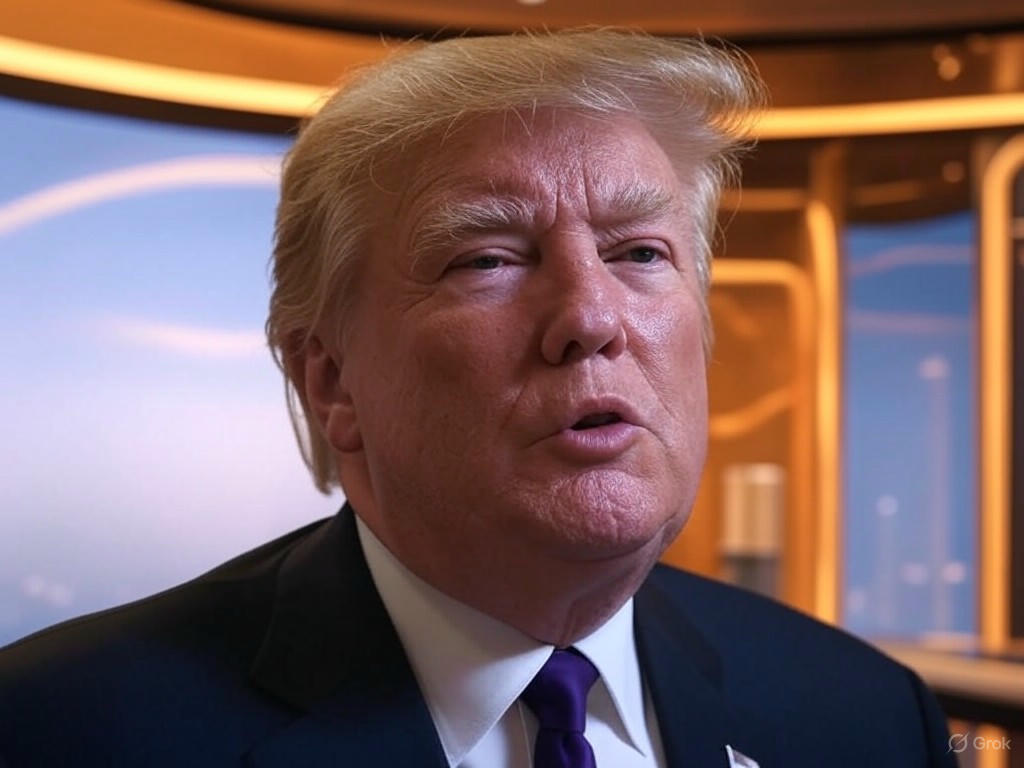
Trump Hesitates on US Due Process Rights Support
President Trump Questions Due Process Rights in Controversial NBC Interview
Have you ever wondered how a simple TV interview could spark nationwide debates on fundamental rights? In a tense exchange on NBC’s “Meet the Press” on May 4, 2025, President Donald Trump raised eyebrows by hesitating on whether non-citizens deserve Trump due process protections. This moment, with host Kristen Welker probing the issue, highlights ongoing tensions in U.S. immigration policy and constitutional safeguards.
Trump’s comments come amid escalating scrutiny of his administration’s deportation efforts, where critics argue that core principles are being overlooked. By questioning these rights, he touches on a debate that’s far from new, potentially affecting millions in the immigration system.
The Critical Exchange on Trump Due Process Principles
The heart of the controversy unfolded when Welker confronted Trump about the case of Kilmar Abrego Garcia, an undocumented immigrant from El Salvador. Despite a Supreme Court order to facilitate his release, Abrego Garcia was deported due to what officials called an “administrative error,” igniting questions about Trump due process enforcement.
Trump shifted blame to El Salvador’s President Nayib Bukele, claiming he wouldn’t return the individual, even though Bukele had already made his stance clear in an Oval Office meeting. What does this say about accountability in high-stakes decisions? It’s a reminder that every action in immigration policy ripples through real lives.
When Welker asked point-blank if non-citizens deserve due process, Trump’s pause spoke volumes, drawing sharp criticism from legal experts. This Trump due process hesitation isn’t just a soundbite—it’s fueling broader conversations about fairness in America.
Constitutional Context: The Fifth Amendment and Due Process
At its core, the U.S. Constitution’s Fifth Amendment promises due process for all, regardless of citizenship. Yet, Trump’s remarks challenge this precedent, as seen in landmark cases like Reno v. Flores, which affirmed protections for non-citizens in removal proceedings.
Imagine being in a foreign country, facing deportation without a fair chance to defend yourself—it’s a scenario that hits close to home for many. A recent Supreme Court opinion in Trump v. J.G.G. on April 7, 2025, echoed these protections, with Justice Sotomayor’s dissent emphasizing the need for proper notification and challenges in deportation cases.
This ongoing Trump due process debate underscores how constitutional safeguards are meant to adapt, not erode, under pressure from policy shifts.
The Alien Enemies Act and Recent Legal Challenges
Another layer to this story involves the Alien Enemies Act, which the administration has eyed for deportations. Justice Sotomayor’s dissent pointed out how the Department of Homeland Security moved Venezuelan migrants abruptly, often without explanation, raising red flags about Trump due process violations.
Picture families torn apart overnight, detainees pulled from cells and told of impending deportation to unknown places. Many denied any gang ties, yet they were targeted, leading to a class action lawsuit in the District of Columbia. The suit argues that such moves bypass the Due Process Clause, questioning if we’re upholding the values we claim to cherish.
These challenges aren’t isolated; they reflect a pattern where Trump due process concerns intersect with national security narratives, forcing courts to step in.
Implications for Immigration Policy and Constitutional Rights
Trump’s interview isn’t just talk—it’s reshaping how we view immigration enforcement. By casting doubt on due process for non-citizens, it challenges years of legal tradition and could influence future policies.
Exploring the Oath of Office and Trump Due Process Obligations
Remember, every president swears to “preserve, protect, and defend the Constitution.” Trump’s hesitation might conflict with that pledge, especially since courts have consistently applied due process to all within U.S. borders. This tension between tough policies and rights protection is a balancing act we’re all navigating.
For instance, if you’re following immigration reform, think about how this could affect asylum seekers or families awaiting decisions. It’s not just abstract law; it’s about real people and their futures.
Media Coverage and Public Response
The fallout from the interview has been swift, with outlets like Mother Jones and NPR dissecting Trump’s words. This Trump due process discussion has polarized opinions, with civil rights groups alarmed and immigration hardliners defending the approach as essential for safety.
What’s your take—does national security trump individual rights, or vice versa? Social media has amplified these voices, turning what started on TV into a viral conversation.
Historical Context of Due Process for Non-Citizens
Dive into history, and you’ll see that due process for non-citizens has roots in the 19th century, upheld in cases that define American justice. The Constitution speaks of “persons,” not just citizens, emphasizing equality under the law.
Over time, rulings have reinforced this, making Trump’s stance a potential step backward. It’s like revisiting old debates in a new era, where global migration tests our foundational principles.
In a hypothetical scenario, consider how this could play out in today’s border challenges—do we risk eroding rights for the sake of efficiency?
The Role of Social Media in Shaping Public Discourse on Trump Due Process
In our digital world, platforms like Twitter and Facebook turn moments like this into movements. Research from sources like the Knight First Amendment Institute shows how algorithms can spread misinformation, intensifying debates on Trump due process.
Ever shared a post that went viral? That’s the power at play here, where AI-driven feeds might prioritize engagement over accuracy, muddying complex issues. To counter this, staying informed from reliable sources is key—it’s a strategy we can all adopt.
Looking Ahead: Trump Due Process Challenges and Policy Directions
As legal battles continue, the future of immigration policy hangs in the balance. Courts will likely clarify due process boundaries, influencing how administrations operate.
Here’s a tip: If you’re passionate about this, follow ongoing cases or join advocacy groups to make your voice heard. It’s about turning awareness into action for a fairer system.
This evolving Trump due process landscape could redefine executive power, urging us to reflect on what’s at stake for democracy.
Conclusion: Constitutional Principles at a Crossroads
In wrapping up, Trump’s hesitation on due process rights marks a pivotal moment in U.S. history, blending policy with profound ethical questions. As debates rage on, remember that every citizen has a role in shaping outcomes.
What are your thoughts on balancing security and rights? I’d love to hear in the comments below—share this post or explore more on our site to dive deeper.
Ready to engage? Check out related articles or connect with us for updates on constitutional issues.
References
1. “Trump’s Meet the Press Interview on Deportation,” Mother Jones, https://www.motherjones.com/politics/2025/05/trump-constitution-deportation-meet-press/
2. Supreme Court Opinion in Trump v. J.G.G., Supreme Court of the United States, https://www.supremecourt.gov/opinions/24pdf/24a931_2c83.pdf
3. “President Trump Questions Due Process Rights,” KGOU, https://www.kgou.org/politics-and-government/2025-05-04/during-tv-interview-president-trump-questions-due-process-rights-of-u-s-residents
4. AI Content Safety Dataset, Hugging Face, https://huggingface.co/datasets/nvidia/Aegis-AI-Content-Safety-Dataset-2.0
5. Search Engines and Social Media Study, Knight First Amendment Institute, https://knightcolumbia.org/content/search-engines-social-media-and-editorial-analogy
6. GSA Emails on Technology, General Services Administration, https://origin-www.gsa.gov/system/files/2020_-_January-April_2020_emails.pdf
7. Social Media and Information Disorder Study, PMC, https://pmc.ncbi.nlm.nih.gov/articles/PMC11142451/
8. Internet and Digital Media Education, C3 Teachers, https://c3teachers.org/wp-content/uploads/2024/04/Internet.IDM_.05.23.pdf
Trump due process, immigration rights, constitutional principles, Meet the Press interview, deportation policy, Trump immigration debate, due process rights, executive power limits, non-citizen protections, constitutional governance







